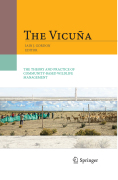
The vicuña: the theory and practice of community based wildlife management
Gordon, I.J.
The vicuña is one of the few success stories of wildlife conservation. The focus is now shifting from protection to sustainable use. Internationally, policy development has followed the community-based conservation paradigm, which holds that economic benefits from wildlife management practices bring greater commitment on the part of local communities to protect both the species and its habitat. This book takes the position that sustainability is not guaranteed bysustainable use, and that both education and regulation are required to prevent the proliferation of unsustainable practices. The research from the countries presented in this book demonstrate the animal welfare, ecological, economic, social, and conservation trade-offs, which exist between different management systems. This links economics, social and conservation research to provide aunique insight into the viability of community-based wildlife management of aspecies which until recently was viewed simply as a conservation priority. Most books on this species are in Spanish There is a strong South American market for this title INDICE: The philosophy of sustainable wildlife use.- A natural history of the vicuña.- The vicuña: A historical analysis of populations and exploitation.- The vicuña: distribution and genetics.- International policies and nationallegislation concerning vicuna conservation and exploitation.- Management systems; rationale and implications.- Local participation in vicuña management.- Environmental education.- Lessons for the future of sustainable wildlife use.- Appendices.
- ISBN: 978-0-387-09475-5
- Editorial: Springer
- Encuadernacion: Cartoné
- Páginas: 265
- Fecha Publicación: 01/11/2008
- Nº Volúmenes: 1
- Idioma: Inglés
